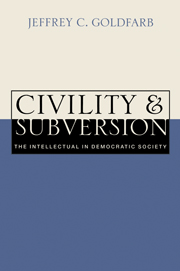Book contents
- Frontmatter
- Contents
- Acknowledgments
- 1 Introduction: the intellectuals at century's end
- 2 Who are the intellectuals?
- 3 The civil intellectual and the public
- 4 The subversive intellectual and the public
- 5 The civil society ideal
- 6 The intellectuals and the politics of culture after communism
- 7 The university
- 8 Race and discursive disruption
- 9 Race and sustained deliberation
- 10 Why is there no feminism after communism?
- 11 Civility and subversion in cynical times
- Notes
- Bibliography
- Index
11 - Civility and subversion in cynical times
Published online by Cambridge University Press: 06 July 2010
- Frontmatter
- Contents
- Acknowledgments
- 1 Introduction: the intellectuals at century's end
- 2 Who are the intellectuals?
- 3 The civil intellectual and the public
- 4 The subversive intellectual and the public
- 5 The civil society ideal
- 6 The intellectuals and the politics of culture after communism
- 7 The university
- 8 Race and discursive disruption
- 9 Race and sustained deliberation
- 10 Why is there no feminism after communism?
- 11 Civility and subversion in cynical times
- Notes
- Bibliography
- Index
Summary
We see, then, intellectuals contributing to democratic society. They are people concerned about gender injustice and the problems of race, with the importance of cultural freedom and the continuities of tradition, people who defend Western civilization and people who radically question this civilization. They are distinguished by the abnormal attention they pay to their critical faculties. They use their specialized skills and knowledge to address and constitute public life. They contribute to society's capacity to deliberate about its problems. Some address themselves to elites, some to broader publics. They do so by both cultivating civil society and subverting the constraints of common sense. They promote a civil consensus, and they subvert the limitations of conventional wisdom. They are talk provokers.
Intellectuals have long been with us, but it is in modernity that they find themselves in a relatively stable position in independent cultural institutions. It is worth working for this independence, as our colleagues in post-communist Europe know. It makes it possible to sustain deliberations in a modern social order. But the independence of cultural institutions also entails problems. They can become distanced from the society at large and make it difficult for intellectuals to contribute to public life, as has sometimes been the case in American universities. Specialized languages, not understandable to the lay public, are used to sustain the authority of the professional. Political rhetoric develops, as is the case with political correctness, which has little to do with the concerns of the greater society.
Information
- Type
- Chapter
- Information
- Civility and SubversionThe Intellectual in Democratic Society, pp. 203 - 221Publisher: Cambridge University PressPrint publication year: 1998
